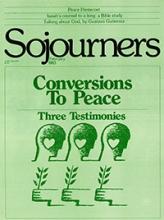This article is taken from Peacemakers: Voices from the New Abolitionist Movement, edited by Jim Wallis. Peacemakers was published by Harper and Row in the spring of 1983. --The Editors
Read the Full Article

Already a subscriber? Login

This article is taken from Peacemakers: Voices from the New Abolitionist Movement, edited by Jim Wallis. Peacemakers was published by Harper and Row in the spring of 1983. --The Editors
